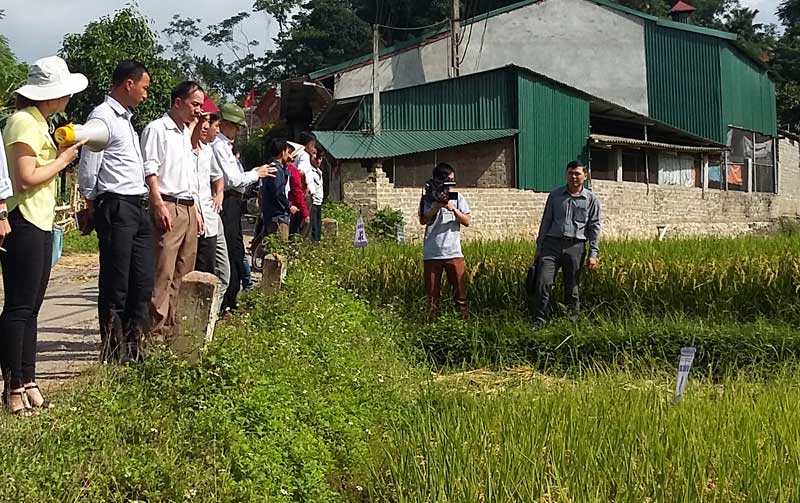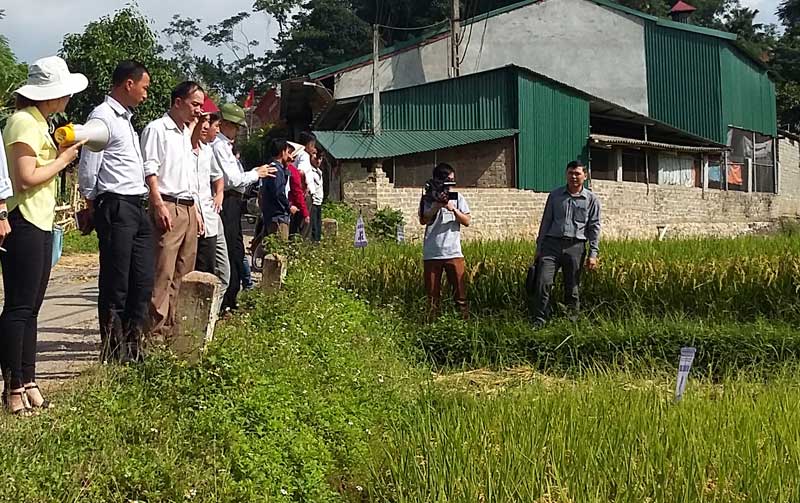
(HBO) –Those who had a chance to taste Muong Chieng rice in Da Bac district, Hoa Binh province, are sure to remember its good taste. If cooked with a right water ratio, the rice is fragrant and soft, which tastes good even with only fish sauce. It is the reason why anyone who goes on working trips to Muong Chieng looks to buy this kind of rice to bring home.

Xa Van Lam, head of Ban Ha hamlet,
said the rice is good for both home use and selling. People from other localities
buy this rice for use at home or as gift. Local farmers now want to cultivate
only this rice variety – called the J02, which is planted in almost all areas
of farming land in the commune. Rice fields in the locality are green with nice
fragrance coming into hamlets.
"My family has 3,000 sq.m of rice
fields. We harvested 40 bags of rice, each weighing
45 kg, which translated into
a productivity of more than 8 tonnes of rice per ha during the past
winter-spring crop,” he said, adding that J02 has become a special rice variety
of Muong Chieng. The commune now has
14.5 ha of land cultivated with this rice
variety.
Xa Van Hung, Chairman of the Muong Chieng People’s Committee, said water
rice is the main plant of Muong Chieng commune where weather and soil
conditions are suitable for rice cultivation. Agriculture is the traditional
means of living, and local farmers are hard-working. In the past, locals used
to cultivate hybrid rice varieties such as Nhi uu 838, which had stable
productivity but rice seeds and cultivation materials cost a lot. Over the past
several years, the commune piloted J02, a purebred rice variety provided by the
Agricultural Genetics Institute. With the support of the district, in the 2017
spring crop, Muong Chieng continued to cultivate the rice variety in
8 ha of land with the
participation of 50 households in Na Muoi, Ban Ha, Na Phang and Na Nguom
hamlets.
According to data from the Hoa Binh Provincial Party Committee, the industrial production index for the first six months of 2025 is estimated to have increased by 20% compared to the same period last year. This marks the highest year-on-year growth rate for this period since 2020.
In the first six months of 2025, Hoa Binh province’s export turnover was estimated at 1.145 billion USD, marking an 18.11% increase compared to the same period in 2024. Import turnover was estimated at $ 804 million, a 17.15% increase, which helped the province maintain a positive trade balance.
The lives of the ethnic minority farmers in Tan Lac district have gradually improved thanks to the new directions in agricultural production. This is a testament to the collective strength fostered through the professional associations and groups implemented by various levels of the district’s Farmers’ Union.
With the motto the "product quality comes first,” after nearly one year of establishment and operation, Muong village’s Clean Food Agricultural and Commercial Cooperative, located in Cau Hamlet, Hung Son Commune (Kim Boi district), has launched reputable, high-quality agricultural products to the market that are well-received by consumers. The products such as Muong village’s pork sausage, salt-cured chicken, and salt-cured pork hocks have gradually carved out a place in the market and they are on the path to obtaining the OCOP certification.
In the past, the phrase "bumper harvest, rock-bottom prices" was a familiar refrain for Vietnamese farmers engaged in fragmented, small-scale agriculture. But today, a new spirit is emerging across rural areas of Hoa Binh province - one of collaboration, organisation, and collective economic models that provide a stable foundation for production.
Maintaining growing area codes and packing facility codes in accordance with regulations is a mandatory requirement for agricultural products to be eligible for export. Recently, the Department of Agriculture and Environment of Hoa Binh province has intensified technical supervision of designated farming areas and packing facilities to safeguard the "green passport" that enables its products to access international markets.



